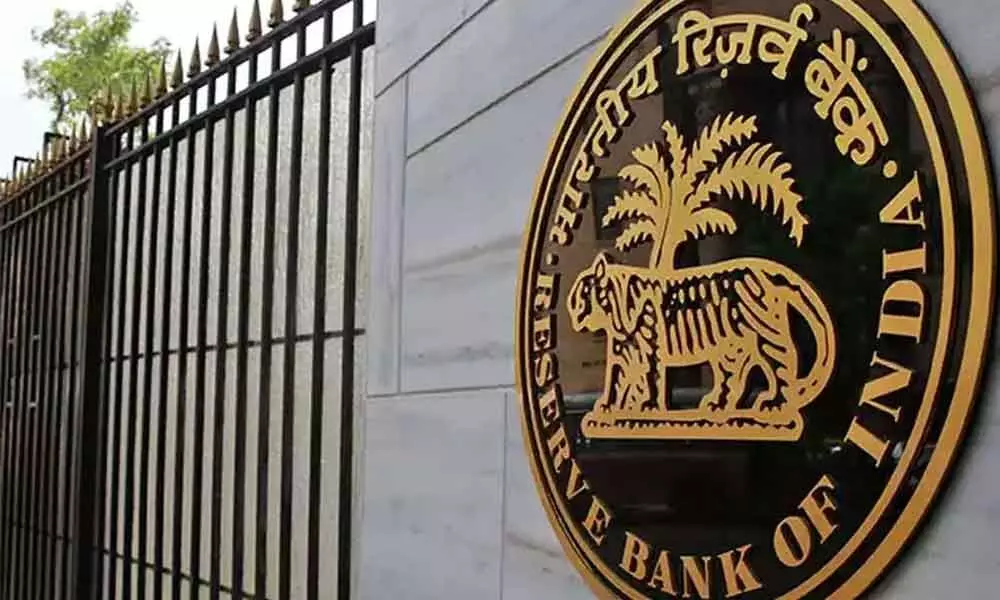Live
- World Heritage Week celebrations conclude
- Coronation of Vishvaraj as Mewar’s 77th successor starts amid questions over palace visit
- Give utmost priority to research: SKLTHU V-C
- IT Min launches ‘Transforming 10,000 Minds’ prog
- TTD Board member interacts with locals in Tirumala
- Uttam prods babus to fast-track irrigation projects across State
- Union minister Pradhan launches 'The Teacher App'
- Oppn members seek more time for JPC on Waqf Bill
- SC upholds ‘secular, socialist’ in Preamble
- RASS conducts Siva Parvathi Kalyanam
Just In
RBI will buy Rs 3 lakh crore govt bonds in FY22


RBI will buy Rs 3 lakh crore govt bonds in FY22
The intention is to cap the benchmark bond yield under 6%, while narrowing its spread with the repo rate to around 150 basis points
The Reserve Bank of India will seek to buy more than Rs 3 lakh crore ($41 billion) of sovereign bonds in the next fiscal year to support the government's borrowing plans, according to a person with knowledge of the matter. That will exceed the Rs 3 lakh crore the RBI is expected to spend for the current year ending March, the person said, asking not to be identified as the deliberations are private. The intention is to cap the benchmark bond yield under 6 per cent, while narrowing its spread with the repo rate to around 150 basis points, the person said.
This is the first time there's a clear signal on how much the RBI would spend on bond purchases, as recent market selloffs test its patience. The schism between traders and the central bank had widened on Friday when Governor Shaktikanta Das's assurances on providing liquidity fell short of expectations and led to the partial cancellation of a debt auction.
Spread between the 10-yr yield and policy rate remains high
"This possibility of OMOs, if followed up to the fullest, will certainly provide relief to the market from over supply," said Naveen Singh, head of fixed-income trading at ICICI Securities Primary Dealership Ltd. in Mumbai. "On the flip side, it will reduce the opportunity to trade."
The RBI on Monday announced plans to buy 200 billion rupees of bonds through open-market operations on Feb. 10. Bonds extended gains. The benchmark 10-year yield dropped three basis points to 6.04 per cent. The most-traded 5.77 per cent 2030 bond yield fell four basis points to 6.09 per cent.The RBI didn't immediately reply to queries.
Traders on Friday had hoped that the RBI will announce a calendar for its bond purchases after Prime Minister Narendra Modi's administration had announced plans for near-record borrowings. Instead, Das offered measures that included letting retail investors buy sovereign debt while allowing banks the right to hold more bonds without marking to market for a year longer. The bank rule leeway will ensure four trillion rupees worth of bond demand, the person said.
Missed signals
An explicit buying calendar could jeopardise the RBI's foreign-exchange strategy, the person said in explaining the deliberations.
The central bank will conduct open-market bond purchases to replenish the system with durable liquidity when the cash reserve ratio is unwound, the person said. The central bank is confident it can push through the government's borrowing plans because the target to shrink the budget deficit to 6.8 per cent of GDP in the next fiscal year from the estimated 9.5 per cent this year is contractionary, the person said. That means monetary policy can stay easy, the person said. The RBI also wants to flatten the yield curve to better reflect inflation expectations, the person said. It will continue with Operation Twists - where the RBI sells short-term debt while buying longer bonds - to achieve this.
Tug of war
So far, the RBI has bought a net 2.5 trillion rupees of debt in the current fiscal year, while the spread between the 10-year bond yield and the repo rate is at more than 200 basis points. Yields on the benchmark 10-year bond surged 17 basis points last week, its biggest jump since April. The RBI, as the government's debt manager, now finds itself with the delicate task of rolling back pandemic-era emergency measures and seeing through the government's borrowing without roiling the jittery market. "We believe the tug of war between the RBI's motivation to support the bond market via OMOs, and fundamentals that call for gradual liquidity normalization, is set to intensify," Nomura Holdings Inc. analysts including Sonal Varma wrote in a note.
(Bloomberg)

© 2024 Hyderabad Media House Limited/The Hans India. All rights reserved. Powered by hocalwire.com






